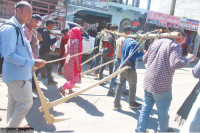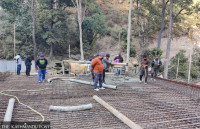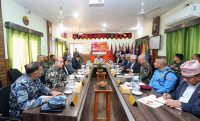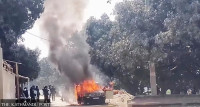National
Lawmakers urge government to take care of Nepalis in India and Pakistan
Indian envoy assures there won’t be supply chain disruptions in Nepal despite conflict.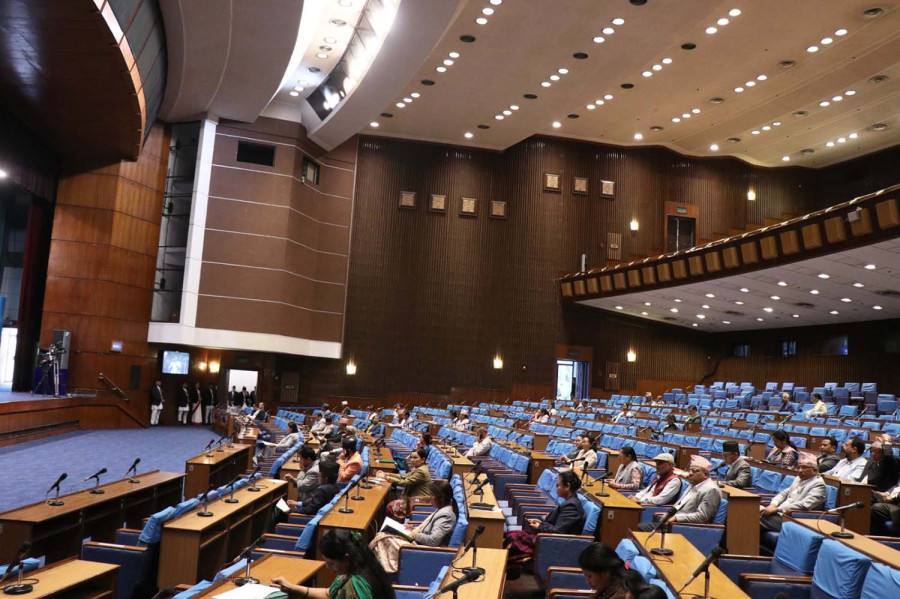
Anil Giri
Calls have been growing to ensure the safety and security of Nepali nationals and students living and studying in India and Pakistan, especially in areas where the armies of the two South Asian nuclear-armed nations are engaged in conflict.
The Ministry of Foreign Affairs issued an advisory on Friday for Nepali students studying in Pakistan, and the Nepali Embassy in New Delhi also urged Nepali nationals living in India to remain safe and secure. It advised them to contact the embassy’s designated phone if they needed any help or assistance.
After some lawmakers on Friday raised concerns in the House of Representatives on the safety Nepali nationals and students amid escalating tensions between India and Pakistan in the wake of attacks and counter attacks from both sides, Speaker Devraj Ghimire also urged the government to ensure the safety of Nepali nationals residing in the two countries.
Drawing the attention of the government to the issue, Speaker Ghimire said, “I draw the attention of the government of Nepal to make necessary arrangements to ensure the safety of all Nepali citizens residing there and to address any potential problems.”
During the House session on Friday, several lawmakers voiced concerns over increasing tensions between India and Pakistan, noting that the situation poses a security risk for Nepalis living in those countries and urging the government to take the matter seriously. Since Thursday night, there have been missile and drone attacks between India and Pakistan.
Some Nepali students studying in Pakistan urged the government to rescue them. According to the Nepali Embassy in Pakistan, all of around 100 Nepali students there are safe.
Sumana Shrestha, a lawmaker from the Rastriya Swatantra Party (RSP), shared an email on Friday on her social media account, X.
“I am writing this on behalf of more than hundred Nepali students studying MBBS or other courses in Pakistan under the scholarship of MOE [Ministry of Education],” said the email sent by a Nepali student to Shrestha stated. “As we all know that there is a state of war between India and Pakistan, its no more safe to stay here in Pakistan as already various places like Bahawalpur, Lahore, Sialkot… have been bombed.”
“All of us are in extreme fear and utterly uncertain. The Nepali Embassy here also shows no response to us. The India-Pakistan border has been closed. The Pakistan airspace has also been closed and all the flights have been cancelled. This additionally creates a sense of fear among us. We want to leave Pakistan ASAP. Kindly address our problem in the parliament house. We need immediate help from the government. Our lives are at risk. Please help us reach back to our country Nepal safely,” said the email to Shrestha. She did not disclose the identity of the student.
Based on the email, Shrestha sent a letter to Foreign Minister Arzu Rana Deuba describing the situation of Nepali students in Pakistan. “… In such a situation, what plan is the ministry working to evacuate the Nepali students,” she said. “If we evacuate them by a chartered flight as we did in Israel then under what condition will we do so? If we are unable to evacuate them, how can we keep them safe? What would be their arrangement for their safe stay inside Pakistan?” Shrestha said in the letter. “Additionally, Nepali students in large numbers are staying in India, what are we thinking about them?”
Another RSP lawmaker Shishir Khanal urged immediate evacuation of 80 Nepali students currently studying in Pakistan.
“If a war-like situation arises between India and Pakistan, Nepal could face impacts on security, economy, and supply chains. There could also be significant effects on Nepalis residing in western India and Pakistan. I call for a comprehensive assessment and proper planning,” Khanal said in Parliament.
“Meanwhile, 80 students studying in Pakistan have requested evacuation. Immediate action should be taken to ensure their safety and rescue. I also request a ruling that this Parliament be informed about the overall situation and the Nepal government’s preparedness.”
The RSP also welcomed the Ministry of Foreign Affairs’ belated statement, issued Thursday evening through a spokesperson, expressing Nepal’s stand on terrorism.
On Friday evening, the Ministry of Foreign Affairs said it was in constant contact with Nepali nationals, including students, in Pakistan. In a statement, the ministry said the government remains “fully alert” on the safety of its citizens following escalating hostilities between the two nuclear-armed neighbours.
The ministry urged Nepali citizens needing urgent assistance to contact the embassy in Islamabad. Third Secretary Vrinda Subedi Khadka can be reached at +92 331 3293119, and Arsalan Mehmood at +92 340 5177421. The embassy can also be contacted via email at [[email protected]].
In retaliation for the killing of 26 tourists, including one Nepali national, in India’s Jammu and Kashmir on April 22, Indian armed forces on Wednesday night launched several airstrikes on nine “terrorist infrastructures” on the Pakistan side.
The Pakistani army also fired missiles in response and vowed to retaliate.
Nepal has called for de-escalation as a measure towards peace. Amid growing calls to clarify its stand on terrorism, the Ministry of Foreign Affairs issued a statement on Thursday and reiterated its “resolute stance against all forms of terrorism”.
Meanwhile, Nepali Embassy in New Delhi has urged Nepali citizens residing in India to follow official security advisories.
“In view of the developments following the terrorist attack in Pahalgam, Jammu and Kashmir, the Nepali Embassy in New Delhi requests all Nepalis residing in India to stay alert and safe, identify the nearest location where emergency services can be accessed in times of crisis, and strictly follow the security advisories issued by official agencies of the Government of India,” the statement issued on Friday said.
Separately, Prime Minister KP Sharma Oli assured Indian Ambassador Naveen Srivastava on Friday that Nepal would not allow its territory to be used against any neighbouring country.
During a meeting at the prime minister’s residence in Baluwatar, Ambassador Srivastava briefed Prime Minister Oli on the recent developments on India-Pakistan conflict.
The prime minister’s secretariat said ambassador Srivastava also expressed gratitude for Thursday’s Nepal government’s statement on the incident.
The Ministry of Foreign Affairs on Thursday stated that, “During this tragic period, Nepal and India stood in solidarity, united in shared grief and suffering. It may be recalled that Nepal had immediately and unequivocally condemned the barbaric terrorist attack, consistent with its resolute stance against all forms of terrorism.”
The ministry added that, “In line with its principled position, Nepal shall not allow any inimical forces to use its soil against its neighbouring countries.” Nepal also affirmed its commitment to lasting peace and stability in the region.
Prime Minister Oli told the Indian envoy that Nepal stands for global peace and, in line with its firm stance against all forms of terrorism, condemned the terrorist attack.
Talking to a group of editors later on the same evening, Ambassador Srivastava assured that there would be no disruption in supplies to Nepal due to the ongoing India-Pakistan conflict and that he was in constant touch with senior Nepali government officials to ensure smooth continuation of such supplies.
He said India had provided Islamabad chances to go off-ramp and end the conflict, but the latter had not taken them. “The ball is now in Pakistan’s court,” he said.




 10.15°C Kathmandu
10.15°C Kathmandu
